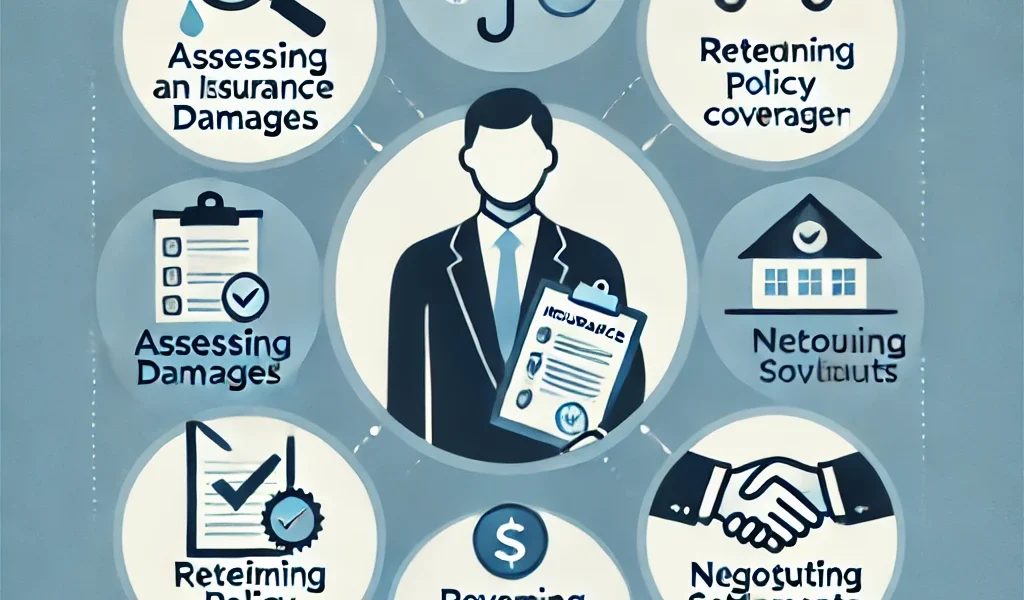When you file an insurance claim, one of the key players in the process is the insurance adjuster. Their role is to assess the damages, determine the payout, and ensure the claim aligns with the policy coverage. Understanding how insurance adjusters operate can help you navigate the claims process more effectively and maximize your settlement. This guide will walk you through the role of an insurance adjuster, how they assess claims, and tips to ensure a fair evaluation.
1. Who is an Insurance Adjuster?
An insurance adjuster, also known as a claims adjuster, is a professional responsible for investigating and evaluating insurance claims. They work for insurance companies, independent firms, or as public adjusters representing policyholders.
Types of Insurance Adjusters:
- Company Adjusters: Employed by insurance companies to evaluate claims and minimize payouts.
- Independent Adjusters: Hired by insurance firms on a contract basis to assess claims.
- Public Adjusters: Hired by policyholders to negotiate a better settlement on their behalf.
2. What Does an Insurance Adjuster Do?
Insurance adjusters play a crucial role in determining claim settlements. Their responsibilities include:
- Investigating the cause of the loss.
- Examining property or medical damages.
- Reviewing policy coverage.
- Estimating repair or replacement costs.
- Negotiating settlements with claimants.
- Preventing fraudulent claims.
3. How Insurance Adjusters Assess Claims
Understanding how adjusters evaluate claims can help you prepare a strong case.
Steps in the Assessment Process:
- Initial Contact: The adjuster reaches out to gather basic information about the claim.
- Inspection: They inspect the damaged property or review medical records.
- Evidence Collection: Includes photos, receipts, and witness statements.
- Policy Review: Determines if the claim falls within policy coverage.
- Settlement Offer: Adjuster provides an offer based on their assessment.
4. How to Ensure a Fair Evaluation
Since adjusters work for insurance companies, their goal is often to minimize payouts. Here’s how you can protect your interests:
Tips to Get a Fair Settlement:
- Document Everything: Take photos, keep receipts, and maintain records of all expenses.
- Get an Independent Estimate: Consult a contractor or expert for a second opinion on damages.
- Understand Your Policy: Know your coverage limits, exclusions, and rights.
- Be Prepared to Negotiate: Do not accept the first offer without reviewing it.
- Consider a Public Adjuster: If your claim is complex or undervalued, a public adjuster can help maximize your payout.
5. Common Tactics Used by Insurance Adjusters
Insurance adjusters may use certain tactics to lower claim settlements. Be aware of these practices to protect yourself:
- Delaying the Claim Process: Some insurers intentionally prolong the process to pressure claimants into accepting a lower settlement.
- Downplaying Damages: Adjusters may underestimate repair or medical costs.
- Requesting Excessive Documentation: This can be a tactic to discourage claimants from pursuing a higher payout.
- Offering a Low Initial Settlement: Many claimants accept the first offer, which is often lower than what they deserve.
6. When to Seek Legal or Professional Help
If you feel your claim is unfairly denied or undervalued, consider seeking professional assistance.
- Hire a Public Adjuster: If you need help negotiating a fair settlement.
- Consult a Lawyer: If your claim is wrongfully denied or underpaid.
- File a Complaint: If you suspect bad faith practices, report the insurer to the regulatory authorities.
7. Final Thoughts
Insurance adjusters play a critical role in claim settlements, but understanding their process can help you get a fair payout. By documenting evidence, negotiating effectively, and seeking professional help when necessary, you can protect your rights and ensure a smooth claims process.




